Bruce Quotes
Bruce Springsteen
'We learned more from a three minute record baby, than we ever learned in school'
Jon Landau
'I saw rock 'n' roll future and its name is Bruce Springsteen. And on a night when I needed to feel young, he made me feel like I was hearing music for the very first time.'
Eric Alterman
'He's the only iconographic figure in my life who ultimately didn't betray me. He keeps growing and changing.'
Damon Gough
'It took me a long, long time to decide that I was going to be a songwriter myself, but 'Thunder Road' started the process.'
Billy Bragg
'Springsteen makes me keep faith in America.'
Dave Marsh Music critic
'The Wild, the Innocent, and the E Street Shuffle is still, to me, one of the greatest records that anybody's ever made. It just left you feeling more alive.'
Nick Hornby
'I'd like my life to be like a Bruce Springsteen song. Just once. I know I'm not born to run, I know that Seven Sisters' Road is nothing like Thunder Road, but feelings can't be different, can they?'
Anthony Esposito
'And that to me, still, is the exceptional thing about Bruce Springsteen. He writes about ordinary things and ordinary people in an extraordinary way,'
Bono
(This is Bono inducting Bruce into the Rock and Roll hall of fame in 1999)
'Rock stars are supposed to make soap operas of their lives, aren't they? If they don't kill themselves first. Well, you can't be a big legend and not be dysfunctional. It's not allowed. You should at least have lost your looks. Everyone else has. Have you seen them? It's like Madame Tussaud's back there. Then there's Bruce Springsteen. Handsome mother with those brooding brown eyes, eyes that could see through America. And a catastrophe of great songs, if you were another songwriter. Bruce has played every bar in the U.S.A., and every stadium. Credibility -- you couldn't have more, unless you were dead. But Bruce Springsteen, you always knew, was not gonna die stupid. He didn't buy the mythology that screwed so many people. Instead he created an alternative mythology, one where ordinary lives became extraordinary and heroic. Bruce Springsteen, you were familiar to us. But it's not an easy familiarity, is it? Even his band seems to stand taller when he walks in the room. It's complex. He's America's writer, and critic. It's like in 'Badlands,' he's Martin Sheen and Terrence Malick. To be so accessible and so private ... But then again, he is an Irish-Italian, with a Jewish-sounding name. What more do you want? Add one big African sax player, and no one in this room is gonna (mess around) with you!
In 1974, I was 14. Even I knew the '60s were over. It was the era of soft-rock and fusion. The Beatles was gone, Elvis was in Vegas. What was goin' on? Nothin' was goin' on. Bruce Springsteen was comin' on, saving music from the phonies, saving lyrics from the folkies, saving leather jackets from the Fonz. (Sings) 'Now the greasers, they tramp the streets and get busted for sleeping on the beaches all night, and them boys in their high heels, ah Sandy, their skins are so white. Oh Sandy, love me tonight, and I promise I'll love you forever.'
In Dublin, Ireland, I knew what he was talking about. Here was a dude who carried himself like Brando, and Dylan, and Elvis. If John Steinbeck could sing, if Van Morrison could ride a Harley-Davidson .... It was something new, too. He was the first whiff of Scorsese, the first hint of Patti Smith, Elvis Costello and the Clash. He was the end of long hair, brown rice and bell bottoms. It was the end of the 20-minute drum solo. It was good night, Haight- Ashbury; hello, Asbury Park.
America was staggering when Springsteen appeared. The president just resigned in disgrace, the U.S. had lost its first war. There was going to be no more oil in the ground. The days of cruising and big cars were supposed to be over. But Bruce Springsteen's vision was bigger than a Honda, it was bigger than a Subaru. Bruce made you believe that dreams were still out there, but after loss and defeat, they had to be braver, not just bigger. He was singing 'Now you're scared and you're thinking that maybe we ain't that young anymore,' because it took guts to be romantic now. Knowing you could lose didn't mean you still didn't take the ride. In fact, it made taking the ride all the more important. "Here was a new vision, and a new community. More than a community, because every great rock group is kind of like starting a religion. and Bruce surrounded himself with fellow believers. The E Street -- it wasn't just a great rock group, or a street gang. It was a brotherhood. Zealots like Steve Van Zandt, the bishop Clarence Clemons, the holy Roy Bittan, crusaders Danny Federici, Max Weinberg, Garry Tallent and later Nils Lofgren. And Jon Landau, Jon Landau, Jon Landau, Jon Landau, Jon Landau. What do you call a man who makes his best friend his manager, his producer, his confessor? You call him the Boss. And Springsteen didn't just marry a gorgeous red-headed woman from the Jersey Shore. She could sing, she could write, and she could tell the Boss off.
For me and the rest of the U2-ers, it wasn't just the way he described the world. It was the way he negotiated it. It was a map, a book of instructions on how to be in the business but not of it. Generous is a word you could use to describe the way he treated us. Decency is another. But these words can box you in. I remember when Bruce was headlining Amnesty International's tour for prisoners of conscience, I remember thinking 'Wow, if ever there was a prisoner of conscience, it's Bruce Springsteen.' Integrity can be a yoke, a pain...when your songs are taking you to a part of town where people don't expect to see you. "At some point I remember riding in an elevator with gentleman Bruce, where he just stared straight ahead of himself, and completely ignored me. I was crushed. Only when he walked into the doors as they were opening, did I realize the impossible was happening. My god, Bruce Springsteen, the Buddha of my youth, is plastered! Drunk as a skunk! ... I have to go back to the book of instructions, scratch the bit out about how you held yourself in public. By the way, that was a great relief.
Something was going on, though. As a fan I could see that my hero was beginning to rebel against his own public image. Things got even more interesting on 'Tunnel of Love,' when he started to deface it. A remarkable bunch of tunes, where our leader starts having a go at himself, and the hypocrisy of his own heart, before anyone else could. But the tabloids could never break news on Bruce Springsteen. Because his fans... he had already told us everything in the songs. We knew he was spinning. We could feel him free falling. But it wasn't in chaos or entropy. It was in love.
We call him the Boss. Well that's a bunch of crap. He's not the boss. He works for us. More than a boss, he's the owner, because more than anyone else, Bruce Springsteen owns America's heart.'
Bruce Springsteen
'Remember: You always want an Irishman to give your induction speech ... I knew I always liked you, Bono. You were scaring me a little bit there --- I wasn't that good -- but I like the part about my good looks!'
Amazon User
Bruce Springsteen: rebel soul, rock renegade, the guy from Philly who only ever sang about cars n' girls; his is a legacy tainted by misinformed parody and undeserved malign. In the 70s he was already unstoppable; in the 80s he adopted a commercial bent that propelled him into the realms of superstar (& beyond) - by 1995, with a fair wedge stashed down in Asbury Park, Springsteen had made his millions, and he'd grown old. He didn't need to sing about racing the caddy no more, nor about dating Bobby Jean or sippin' beers after the game. Instead he put it all aside, dispensed with the E-Street sound completely, picked up his acoustic guitar, and made an album from the brink of desolation, a subtle Dylannesque masterpiece, laced with simple, lax melancholy and brimming with wealth of experience, nostalgia and knowing. Never self-indulgent, 'Tom Joad' showcases The Boss' woefully overlooked songsmanship - it's the greatest record he's ever made. A stylistic departure from past releases, and then some, this is the sound of a man unafraid to sound his age - this is grown up music. Springsteen has been a crucial mouthpiece for blue-collar America for the last 30 years. In assessing his career, let us hope that the inclement critic will turn here in his final pause: a phenomenal legacy, and a totally gorgeous, unrefined, bare-bones folk wonder-work: dripping with honesty, sheer grit and irrepressible subtlety. The soundtrack to your salvation.
References
Alterman, Eric. It Ain't No Sin To Be Glad You're Alive : The Promise of Bruce Springsteen. Little Brown, 1999. ISBN 0316038857.
Coles, Robert. Bruce Springsteen's America: The People Listening, a Poet Singing. Random House, 2005.
Cross, Charles R. Backstreets: Springsteen - the man and his music Harmony Books, New York 1989/1992. ISBN 051758929X. Contains 15+ interviews and a complete list of all Springsteen songs including unreleased compositions. Complete lising of all concerts 1965-1990 - most of them with tracklists. Hundreds of previously unreleased high quality color pictures.
Cullen, Jim. Born in the U.S.A.: Bruce Springsteen and the American Tradition. 1997; Middletown, CT: Wesleyan University Press, 2005. New edition of 1997 study book places Springsteen's work in the broader context of American history and culture. ISBN 0819567612
Eliot, Marc with Appel, Mike. Down Thunder Road. Simon & Schuster, 1992. ISBN 0671868985.
Graff, Gary. The Ties That Bind: Bruce Springsteen A to E to Z. Visible Ink, 2005.
Guterman, Jimmy. Runaway American Dream: Listening to Bruce Springsteen. Da Capo, 2005.
Hilburn, Robert. Springsteen. Rolling Stone Press, 1985. ISBN 0684184567.
Marsh, Dave. Bruce Springsteen: Two Hearts : The Definitive Biography, 1972-2003. Routledge, 2003. ISBN 041596928X. (Consolidation of two previous Marsh biographies, Born to Run (1981) and Glory Days (1987).)
Wolff, Daniel. 4th of July, Asbury Park: A History of the Promised Land. Bloomsbury, 2005.
 . I think we are the only Springsteen fans on here because the fashionistas on this board and I guess the world in general don't seem to recognise Bruce's inate hipness at present
. I think we are the only Springsteen fans on here because the fashionistas on this board and I guess the world in general don't seem to recognise Bruce's inate hipness at present 
 When you all catch up, Polly and I reserve the right to say I told you so.
When you all catch up, Polly and I reserve the right to say I told you so.  . I think we are the only Springsteen fans on here because the fashionistas on this board and I guess the world in general don't seem to recognise Bruce's inate hipness at present
. I think we are the only Springsteen fans on here because the fashionistas on this board and I guess the world in general don't seem to recognise Bruce's inate hipness at present 
 When you all catch up, Polly and I reserve the right to say I told you so.
When you all catch up, Polly and I reserve the right to say I told you so. 
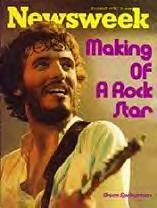
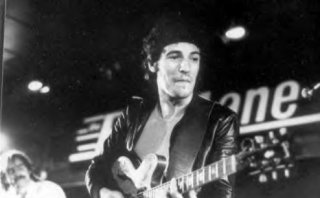
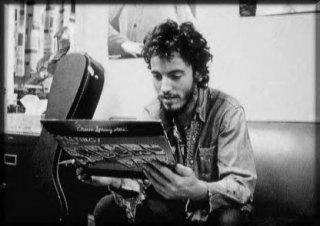
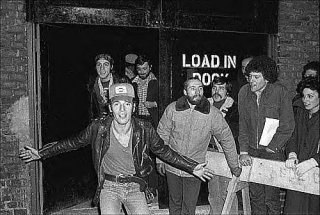
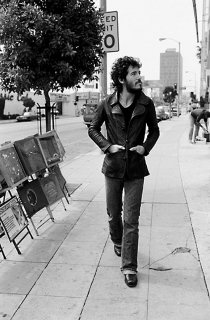
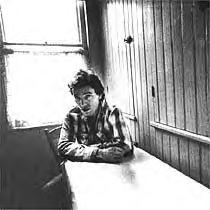
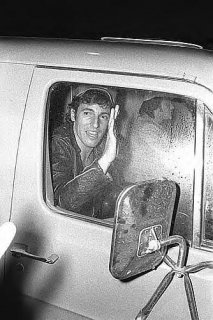

 I am so happy you started this thread! This completely made my day! Great pictures and videos! I love that version of Jungleland - that whole live album is amazing! And I absolutely love his giggle! It drives me crazy.
I am so happy you started this thread! This completely made my day! Great pictures and videos! I love that version of Jungleland - that whole live album is amazing! And I absolutely love his giggle! It drives me crazy. 

